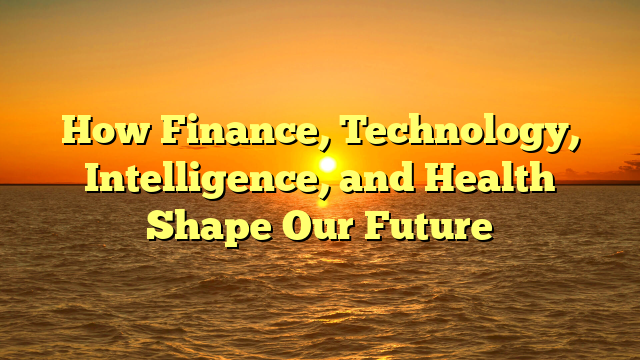—
Finance, technology, intelligence, and health are not just isolated sectors—they are deeply intertwined, influencing each other in ways that shape the future. The integration of these domains is a catalyst for change, and their development is essential for a sustainable future. In this article, we delve into how these four areas are progressing and converging, exploring their mutual influence.
Finance: The Changing Landscape of Global Economies
The financial world is in the midst of a revolution. Technologies such as blockchain, cryptocurrencies, and artificial intelligence (AI) are reshaping financial services. The introduction of decentralized finance (DeFi) is challenging the traditional banking model, making finance more accessible and transparent for people around the globe.
Moreover, financial technology (fintech) is revolutionizing the way we interact with money. Online banking, mobile payment systems, and peer-to-peer lending platforms have made financial services more accessible than ever. These advancements have led to the rise of digital banks, which operate without the need for physical branches. Additionally, the democratization of investment through apps like Robinhood has made stock trading more accessible to the general public.
Technology: The Catalyst for Change
Technology is at the core of progress in finance, intelligence, and health. The application of AI, machine learning, and data analytics is transforming the way industries operate. In finance, technology is enhancing risk management, improving decision-making, and fostering innovation. Healthcare is experiencing a similar transformation, with AI being used to optimize patient care and predict outcomes. The influence of technology continues to expand, reshaping nearly every aspect of society.
The advent of cloud computing has revolutionized data storage and processing, providing businesses with the tools to make more informed decisions. In the financial sector, this technology is helping companies manage vast amounts of data, analyze trends, and develop predictive models. In healthcare, the cloud is improving communication among professionals and enabling more personalized treatments for patients.
Intelligence: The Role of Artificial Intelligence in Shaping the Future
Artificial intelligence (AI) is rapidly becoming one of the most influential technologies of the 21st century. In finance, AI is used to create algorithmic trading systems, assess risks, and detect fraud. By processing vast amounts of data, AI can predict market trends and optimize investment strategies. In healthcare, AI-powered systems are revolutionizing diagnostics and treatment plans, helping doctors make more informed decisions. Additionally, AI is enhancing the personalization of healthcare by tailoring treatments to individual patients based on their genetic makeup.
While AI offers immense potential, it also presents challenges. Issues like data privacy, algorithmic biases, and job displacement need to be addressed as AI technologies become more embedded in daily life. Ensuring kawat4d is developed and implemented ethically will require cooperation between industry leaders, governments, and other stakeholders to create robust regulations that protect individuals’ rights and promote fairness.
Health: The Intersection of Technology and Well-being
Health technology is evolving rapidly, enabling more personalized and effective treatments. Advances in genomics, AI, and wearable devices are helping doctors tailor treatments to individual patients, improving outcomes. Wearable health devices like fitness trackers are also playing a key role in helping people maintain their health and fitness levels, providing real-time feedback on vital signs like heart rate, steps taken, and sleep patterns.
Moreover, telemedicine has become an essential tool in improving access to healthcare. The rise of virtual consultations, especially during the COVID-19 pandemic, has made healthcare more accessible for individuals in remote areas or those with mobility challenges. Telemedicine platforms allow patients to consult with healthcare providers from the comfort of their homes, reducing travel time and improving efficiency in healthcare delivery.
—
Ultimately, the convergence of finance, technology, intelligence, and health presents exciting possibilities for the future. By embracing innovation in these areas, we can expect a future where access to resources, personalized services, and improved quality of life become a reality for people around the globe.



